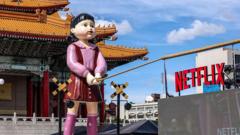Executives from leading firms like Intel, Skechers, and Procter & Gamble highlight the adverse effects of U.S. tariffs on their financial forecasts, while ongoing trade negotiations aim to alleviate tensions.
Corporate Leaders Sound Alarm Over Tariff Pressures

Corporate Leaders Sound Alarm Over Tariff Pressures
Major U.S. companies express concerns regarding the economic uncertainties created by tariffs and their potential repercussions on profits.
In a wave of corporate caution, high-ranking executives from several prominent U.S. companies have raised alarms about the detrimental impacts of tariffs on their businesses and the economy overall. Technology powerhouse Intel, shoemaker Skechers, and consumer products giant Procter & Gamble are among those reporting reduced profit forecasts or retracting them altogether due to prevailing economic uncertainties.
U.S. President Donald Trump's approach of imposing tariffs to reshape trade dynamics has left companies grappling with an unpredictable market. Recent clues hint at progress in discussions with South Korea, yet no formal agreements have surfaced.
David Zinsner, CFO of Intel, divulged during an investor call that "the very fluid trade policies" could increase the probability of an economic downturn. As a result, Intel's stock saw a significant dip of over 5% following the announcement of bleak projections.
Similar sentiments echoed within Skechers, which experienced a backlash from investors after retracting its annual profit outlook. COO David Weinberg articulated the challenges, explaining, "The current environment is simply too dynamic from which to plan results with a reasonable assurance of success."
Procter & Gamble has also flagged potential repercussions from tariffs, with plans to adjust consumer pricing to counterbalance inflated material costs linked to Chinese imports. Financial chief Andre Schulten stated they would seek "every opportunity to mitigate the impact."
Various businesses, including Seven & I—a Japanese company that operates 7-Eleven outlets—shared insights on the uncertainty surrounding tariffs, emphasizing the difficulty of responding to fluctuating trade policies. The incoming CEO, Stephen Dacus, remarked on the challenges of maintaining quality while reducing costs.
Adding to the growing list of corporations expressing concern, South Korean automobile manufacturer Hyundai declared the formation of a task force to address tariff-related challenges. The company foresees a tough business environment amid escalating trade conflicts and evolving macroeconomic conditions.
Conversely, recent trade meetings between U.S. and South Korean officials in Washington may mark a turning point, as Treasury Secretary Scott Bessent described these discussions as "very successful." With a 90-day pause on increased tariffs set to expire on July 8, companies await clearer direction as negotiations progress, with more than 70 nations reportedly seeking resolution following the tariff implementation.






















